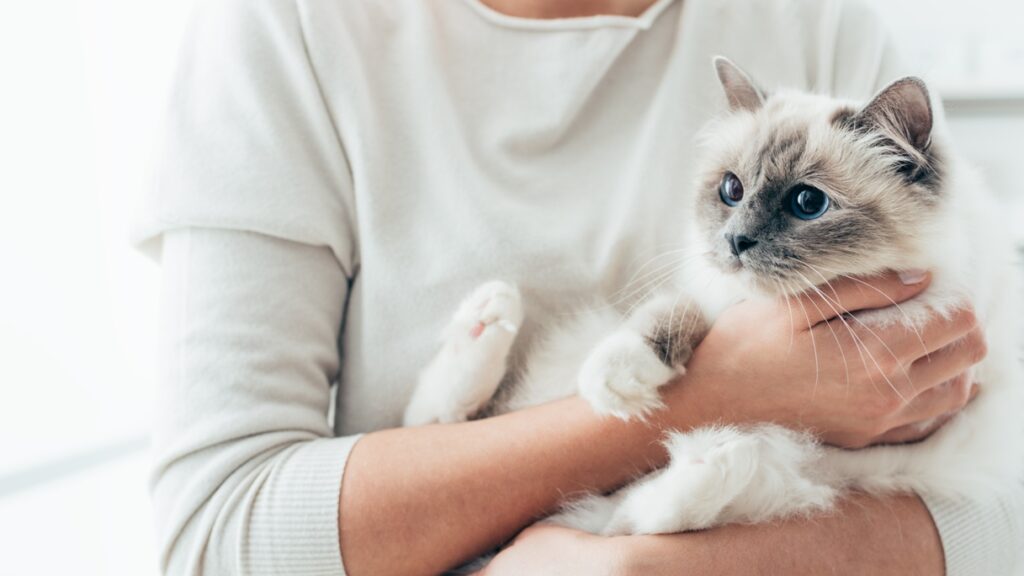Depression is a mental health condition that affects millions of people worldwide. While medication and therapy are the most common treatments, many people are turning to alternative methods such as animal therapy. Cats are one such animal that has been shown to have a positive impact on mental health, including depression.
How do cats provide comfort and companionship to alleviate depression?

Cats are known for their calming presence and affectionate nature, which can provide comfort and companionship to individuals struggling with depression. The unconditional love and support offered by cats can help alleviate feelings of loneliness and isolation, which are common symptoms of depression.
Research suggests that owning a cat can lead to lower levels of depressive symptoms and improved mood. Cats have been found to buffer responses to stress through lowering the heart rate and blood pressure, which can help individuals manage their mental health illness. Spending time with a cat can also release happy and calm chemicals in the brain, which can improve overall mental health.
In addition to providing emotional support, cats can also help individuals establish a stable routine and sense of purpose. Caring for a cat can provide a sense of responsibility and fulfillment, which can be particularly helpful for individuals struggling with depression.
How do Cats Provide Unconditional Love?
Cats are known for their ability to provide unconditional love to their owners. This love is not based on any conditions or expectations, making it a unique bond between a cat and its owner. The bond between a cat and its owner is strengthened through the cat’s ability to show affection and loyalty, which can help alleviate symptoms of depression.
One of the ways cats show unconditional love is through their affectionate behavior towards their owners. They often seek out their owner’s attention and affection, and will cuddle up with them when they sense that they need comfort. This behavior can be especially helpful for those who suffer from depression, as it can provide a sense of comfort and companionship.
Another way cats show unconditional love is through their loyalty to their owners. They will often follow their owners around the house, and may even greet them at the door when they come home. This type of loyalty can help those suffering from depression feel less alone and more supported.
Cats also have a calming effect on their owners, which can help alleviate symptoms of depression. Their purring has been shown to have a meditative effect, which can help reduce stress and anxiety. This calming effect can help those suffering from depression feel more relaxed and at ease.
How Does Purring Help Calm Your Mind?
Cats are known for their purring, and this sound can be incredibly soothing. The act of petting a purring cat can help you relax and lower your stress levels. According to a study from 2009, owning a cat was associated with reduced stress in day-to-day life. The study found that the act of interacting with and petting a purring cat helps their owners calm down and keep their stress levels manageable. Lowered stress helps decrease the risk of certain health conditions, most of them related to the heart.
The calming effect of purring can also have mental health benefits. Studies suggest that cats can help buffer responses to stress through lowering the heart rate and blood pressure. They may even help people manage a long-term mental health illness. Cat ownership is associated with lower levels of depressive symptoms and improved mood.
If you are struggling with depression or anxiety, spending time with a purring cat could be a simple and effective way to help manage your symptoms. The sound of a cat’s purring can help you relax and feel more at ease. Whether you are petting your cat or just sitting nearby, the calming effect of purring can be a powerful tool in managing your mental health.
How can routine and activity with cats help with depression?
Cats can help with depression by providing a sense of routine and activity. Establishing a routine with your cat can help you feel more in control of your day and provide a sense of purpose. This can be especially helpful for those struggling with depression, as it can be difficult to find motivation to get out of bed or engage in activities.
Incorporating activity into your routine with your cat can also be beneficial. Playing with your cat or engaging in other forms of activity can help increase your heart rate and release endorphins, which can improve your mood. Additionally, regular exercise can help reduce symptoms of depression and anxiety.
Here are some tips for incorporating routine and activity with your cat into your daily life:
- Set a daily feeding schedule for your cat and stick to it. This can help provide structure to your day.
- Make time for playtime with your cat each day. This can include playing with toys, using a laser pointer, or engaging in other interactive activities.
- Consider taking your cat for a walk outside on a leash or harness. This can provide both you and your cat with exercise and fresh air.
- Engage in grooming activities with your cat, such as brushing their fur or trimming their nails. This can provide a sense of bonding and relaxation for both you and your cat.
How Can Pets Help as Emotional Support Animals?
Pets can be an excellent source of emotional support for people who suffer from depression, anxiety, PTSD, and other mental health conditions. Emotional support animals (ESAs) are pets that provide comfort and companionship to their owners, and they can be any domesticated animal, including cats.
ESAs are different from service animals as they don’t require any specialized training. However, they must be prescribed by a licensed mental health professional, and their owners must have a diagnosed mental health condition. ESAs are protected under the Fair Housing Act, which means that landlords cannot discriminate against tenants with ESAs.
Cats, in particular, can make great ESAs. Studies have shown that spending time with cats can increase dopamine levels in the body, which is associated with bonding, pleasure, and happiness. Additionally, cats’ purring has a calming effect that can help reduce stress and anxiety levels.
If you’re struggling with depression or another mental health condition, consider talking to your mental health professional about the benefits of having an ESA. A cat could be the perfect companion to help you manage your symptoms and improve your overall well-being.
Can Cats Really Help with Depression? A Look at Scientific Studies
You may have heard that cats can help with depression, but is there any scientific evidence to back up this claim? The answer is yes. Several studies have shown that owning a cat can have a positive impact on mental health, including depression.
In one study, researchers found that cat owners had lower levels of depressive symptoms than those who did not own cats. Another study found that cat owners had lower blood pressure and heart rate, which can be important factors in managing depression.
Cats are also known to provide emotional support and companionship, which can be especially helpful for those struggling with depression. A study published in the Journal of Psychiatric Research found that pet owners, including cat owners, had higher levels of social support and were less likely to feel lonely than those without pets.
Another study found that interacting with cats can increase levels of oxytocin, a hormone that is associated with feelings of happiness and well-being. This increase in oxytocin can help to reduce feelings of depression and anxiety.
While more research is needed to fully understand the mechanisms behind this effect, owning a cat can be a simple and enjoyable way to improve your mental health.
How can you choose the right cat for depression?
Choosing the right cat for depression is an important decision that requires careful consideration. Here are some factors to consider when choosing a cat to help with depression:
What breed is best for depression?
There is no definitive answer to this question. However, some breeds that are often recommended for people with depression include:
- Siamese cats: They are known for their affectionate and playful nature, which can help lift your mood and reduce stress.
- Ragdoll cats: They are known for their calm and gentle temperament, which can help you relax and feel more at ease.
- Persian cats: They are known for their quiet and gentle nature, which can be soothing and comforting.
Should you adopt from a shelter or buy from a breeder?
Adopting a cat from a shelter is often a great option for people with depression. Not only do you get a furry companion, but you also get the satisfaction of knowing that you are giving a loving home to an animal in need. Additionally, many shelters offer discounted adoption fees for people with depression or other mental health conditions.
Should you get a kitten or an adult cat?
While kittens are undeniably cute, they require a lot of time and attention. If you don’t have the energy or resources to care for a kitten, an adult cat may be a better option. Adult cats are often more independent and require less attention than kittens.
Should you microchip your cat?
Microchipping your cat is always a good idea, as it can help ensure that your cat is returned to you if they ever get lost. This can provide peace of mind and reduce stress.
Choosing the right cat for depression requires careful consideration of your own needs and lifestyle, as well as the needs and temperament of the cat you are considering. Consult with a veterinarian or animal shelter staff member for more guidance.


